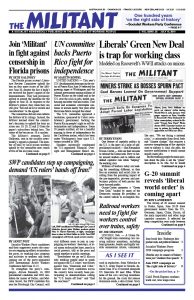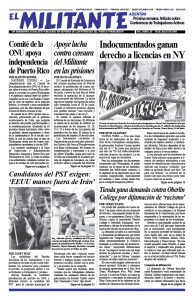UNITED NATIONS — This year’s U.N. decolonization hearings on the status of Puerto Rico June 24 reflected the growing anger at Washington and the colonial government among millions of Puerto Ricans on the island and in the U.S. over the crisis in jobs, health care, housing and other vital necessities. That social and economic catastrophe continues to worsen nearly two years after Hurricane Maria ravaged the island.
The U.N. committee approved a resolution, sponsored by Cuba’s revolutionary government, backing the Puerto Rican people’s right to self-determination and independence. Some 50 people testified, all but a handful arguing in favor of independence for the Caribbean nation, which has been under Washington’s boot since U.S. troops invaded in 1898.
Speakers universally condemned the U.S.-appointed Financial Oversight and Management Board, imposed on Puerto Rico by Washington in 2016 through a law cynically named PROMESA (Spanish for “promise”). The board has ordered colonial authorities to carry out attack after attack on the living standards of working people in order to pay the Puerto Rican government’s $74 billion debt to capitalist bondholders.
“The fiscal control board’s decisions have meant brutal consequences for the people of Puerto Rico, especially the working class,” said Lorraine Liriano of A Call to Action on Puerto Rico, a pro-independence coalition in the U.S. She cited “the closure of more than 400 public schools, cuts in the University of Puerto Rico’s budget, slashing pensions of retired municipal workers, sale of public lands, the proposal to lower the minimum wage of youth under 26 to $4.25 an hour.”
The board has virtually dictatorial powers, said María de Lourdes Santiago, vice president of the Puerto Rican Independence Party. “It decides on what laws will be enforced; it draws up and imposes the public budget” to prioritize paying the bondholders. Santiago added that Washington tries to disguise Puerto Rico’s colonial status with the term “commonwealth” or “free associated state,” but it’s the U.S. government that decides all important matters affecting working people there.
“Our debts are not ours, but those of the imperial power,” said Juan de Dios del Valle, speaking for Jornada por la Dignidad Boricua.
“We join with others to say: Cancel the debt! All of it!” Seth Galinsky, Socialist Workers Party candidate for New York City public advocate, told the panel. He said that “a successful struggle for Puerto Rico’s independence will strengthen working people in the U.S. in the fight against our common exploiters.”
Galinsky pointed to Cuba’s socialist revolution as an example that working people are capable of organizing a revolutionary struggle to take state power, to establish a workers and farmers government, and in the process win real independence. (Galinsky’s statement was printed in last week’s Militant.)
2017 hurricane ‘recovery’ stalled
Several petitioners described the social disaster that was accelerated by the September 2017 hurricane. They condemned the neglect and contempt for working people by U.S. and colonial authorities, which resulted in the death of some 3,000 people.
Today, “recovery and reconstruction efforts remain stalled,” reported Nina Valedón. Some 30,000 Puerto Ricans still live in homes covered with tarps designed to last only a month because the federal government has not released the funds needed to repair roofs torn off by the hurricane, she said, not to mention those they say aren’t eligible. Valedón belongs to Alianza Patria, which backs the pro-Commonwealth Popular Democratic Party.
Two residents of the Puerto Rican island of Vieques, Myrna Pagán of the Bieké Cultural Center and Michael Connelly Reyes of Vieques Lives Matter, testified that the local hospital was closed after the hurricane and there isn’t even a maternity ward on the island.
Several speakers spoke about the tens of thousands who have migrated from Puerto Rico to the U.S. as a result of the economic catastrophe. Some argued that the migration was a result of a deliberate U.S. government policy to depopulate Puerto Rico. But in fact it’s the normal workings of capitalism and the superexploitation of working people there, exacerbated by U.S. colonial rule.
Despite efforts by the capitalist rulers and the big-business media to portray the Puerto Rican people as helpless victims, it was working people who came together to help each other and began to rebuild in the wake of the hurricane destruction, and of the U.S. and Puerto Rican capitalists’ criminal inaction and contempt.
Walter Alomar from the Organization for Culture of Hispanic Origins reported that he recently visited 15 of the closed schools in Puerto Rico. “Every abandoned school was guarded and cared for by the people of the community,” he said, in the face of government neglect.
“It wasn’t thanks to FEMA or federal funds,” said Wilma Reverón of the Hostos National Independence Movement. “Much of what is being restored now in Puerto Rico — agriculture, roofs, bridges, and roads — has mostly been the product of the work by communities, by the hands of Puerto Rican men and women.
“We are showing that we don’t need masters. We need solidarity,” Reverón said. “We need freedom in order to build our country.”

